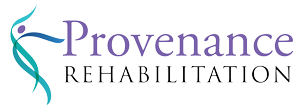Did you know the pelvic floor is working hard throughout your entire pregnancy? The whole time your baby is growing, your pelvic floor is working harder and harder to hold her up against gravity. In fact, all the jobs of the pelvic floor become more difficult as your baby is growing.
Hormones circulating throughout our body relax ligaments that help to stabilize the pelvis normally. With less ligamentous support, your pelvic floor has to work even harder to take up the slack and keep you upright. It’s little wonder that so many women experience things like back or pelvic pain and incontinence during pregnancy and after — even when they have not had a vaginal delivery!
For many women, these issues may improve postpartum or at least be less noticeable. But, what happens if the symptoms don’t go away, get worse or come back with your second pregnancy? This is where pelvic floor physical therapy can be of help.
What is Pelvic Floor Rehabilitation Physical Therapy?
Postpartum Pelvic Floor Rehabilitation Physical Therapy is a type of physical therapy that focuses on the muscles and ligaments in the pelvic floor most affected by pregnancy and birth. It involves exercises that encourage improved function of the muscles of the lower pelvis. When pelvic muscles become too tight or too weak, it can cause inconvenient symptoms.
>> Learn more about What Happens to Your Pelvic Floor During Pregnancy
What Can I Expect from Postpartum Pelvic Floor PT?
Postpartum Pelvic Floor Physical Therapy accentuates the natural healing capacity of the body and addresses any of the postpartum physical symptoms you may be having. Different techniques are combined for a full spectrum of care.
Manual therapy
Any form of hands-on treatment used by physical therapists to treat musculoskeletal pain and disability is referred to as manual therapy. It can include kneading and manipulation of muscles, joint mobilization, and joint manipulation to name a few techniques.
Trigger point therapy
Trigger point therapy is designed to alleviate sources of pain through cycles of isolated pressure and release.
Scar Management
Designed to help improve healing, reduce sensitivity and minimize restrictions at the site of surgical cuts (e.g. episiotomies and cesarean scars) and perineal tears that occur naturally during vaginal delivery.
Muscle training
This may include lengthening or relaxing tight muscles or strengthening weak, underactive muscles. Your physical therapist will assess your pelvic floor muscles and make personalized recommendations to help you reach your goals.
Bowel and Bladder Training
Regaining control of bladder and bowel function postpartum is often high on the list of priorities for new moms. Physical therapists work to identify the source of your problem – whether it’s leakage, frequency, or difficulty voiding – then guide you through key dietary or habit changes to reduce these pesky symptoms.
>> Learn more about the treatment techniques that Provenance Physical Therapists utilize
What Postpartum Issues Can Pelvic Floor Rehab Help With?
Urinary issues
People who suffer from pelvic floor disorders can experience urinary issues such as incontinence, an urgent need to urinate, painful urination or incomplete emptying of their bladder.
Bowel issues
Constipation, urgent need to have a bowel movement, inability to hold back gas and stool leakage are just a few of the common postpartum complaints women experience.
Pelvic pain
Pelvic pain can arise from muscles, nerves, connective tissues and scars.
Diastasis recti
This occurs when the large abdominal muscles separate. Common during pregnancy, it does not always resolve postpartum. A bulge in the middle of the belly or a reduction in core strength are some of the common symptoms.
Pelvic Organ Prolapse
Pelvic organ prolapse happens when the muscles and tissue of the pelvic floor can not support the pelvic muscles resulting in the drop of the pelvic organs from their normal position. Symptoms can include a feeling of heaviness or fullness in the vagina, feeling of “sitting on a golf ball” or feeling of something falling out.
Kegels Don’t Solve Every Postpartum Issue
Kegels can help a weak pelvic floor, but many people are not doing Kegels correctly. Positioning can be wrong, quantity or the number of Kegels may be too much or too little, and not identifying the proper muscles while doing Kegels can cause more damage. As stated by Kate Marple for BabyCenter, “if your problem is caused by chronic tightness in the pelvic floor muscles, practicing contracting but not releasing them can actually make the muscles tighter and the symptoms worse.”
Provenance Rehabilitations Healthy Moms Postpartum PT Screening in Alpharetta, GA
Provenance has a screening at our office in Alpharetta, GA for new moms starting 6+ weeks after delivery. It is an individualized wellness program that offers physical therapy screening for common postpartum conditions such as diastasis recti (abdominal muscle separation), incontinence (leaking of urine or feces), pain from a vaginal tear, episiotomy, or C-section, and pelvic floor dysfunction (weakness, pain, etc).
>> Sign up for your Postpartum PT screening at our Alpharetta office today
An ounce of prevention…
We often limit our view of postpartum to the year or so immediately after giving birth. That’s a pretty limited view given the degree of permanent changes that happen in a woman’s body during and after pregnancy. Often in our practice, we see women who begin experiencing pelvic floor issues with subsequent pregnancies or even as late as menopause.
Having the tools to recover well from a first pregnancy can in some instances reduce the risk of developing these issues down the road. As the old saying goes, “an ounce of prevention is worth a pound of cure.” Give your local pelvic floor therapist a call to discuss your concerns and see if pelvic floor therapy may be right for you.
